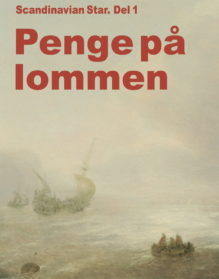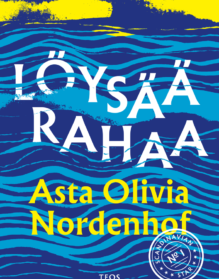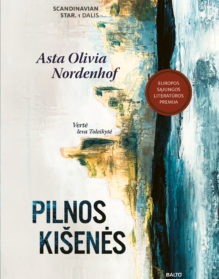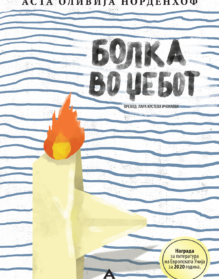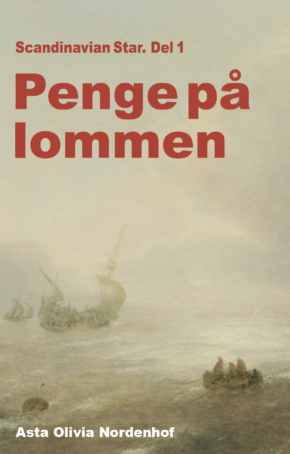
On a bus to Funen, Denmark, an unknown narrator experiences a frightening epiphany that catapults her into the story of Kurt and Maggie.
Kurt and Maggie’s relationship sprung from wild passion, but it was doomed from the start due to the burden of poverty that inexorably clung to their minds and flesh. Before they met, both were forced to sell their bodies in order to survive. Maggie at fourteen when she got kicked out by her parents, Kurt as an eighteen-year-old single father needing to feed his baby. As adults, Kurt’s work provides the couple with financial stability, but they can’t escape the humiliation of their poor backgrounds. The love between them is diluted by violence, misery, and addiction. Kurt’s fear of losing Maggie makes him hurt her while Maggie has learned to expect abuse. In a hopeless cycle, he is ashamed and begs for her forgiveness and she blames herself for making him unhappy.
In Money to Burn, award-winning poet and author Asta Olivia Nordenhof tells the story of Maggie and Kurt through different layers of love, abuse, and poverty. From harsh teenage years, their first electric encounter, and having their daughter, to Maggie dying at Odense Hospital unbeknownst to Kurt. Through shifting timelines and narratives, their relationship unfolds – and shatters.
At the novel’s midpoint, Nordenhof suddenly leaves Kurt and Maggie behind for an examination of what really happened in 1990 when the passenger ferry Scandinavian Star caught fire, killing 159 people. She presents evidence of how the cause of the fire was the financial gain of certain people, showing that the horrible accident was in fact murder. “Capitalism is a massacre”, she concludes.
Money to Burn is a brutal and at times darkly funny indictment that exposes how money – the lack and abundance of it – affects life, and love. With ingenious style and brilliant clarity, Asta Olivia Nordenhof showcases the connection between capitalism and violence – from a stranger, from a loved one, and from society. Capitalism can force people to steal, abuse, and murder, and people like Maggie and Kurt are sacrificed on its altar.
Money to Burn was shortlisted for the Nordic Counsel Literature Prize 2021 and won the European Prize for Literature 2020. It is the first novel in a planned septology about the fire on the Scandinavian Star ferry in 1990. The second book is planned for the spring of 2023.
Extra Materials
Reviews
“Asta Oliva Nordenhof writes and composes a novel with such elastic and vibrant, almost arrogant sovereignty: it hovers over the waters and dives into the depths like a turbo-flying fish.”
Weekendavisen (DK)
“How do you write a social-realistic, political novel about capitalism in the 21st century? This is how you do it! […] Nordenhof writes insanely well, and has no problem with the novel form, perhaps especially because she manages to find an extremely agile narrative voice.”
Politiken (DK)
“The indignation and sorrow, the criticism of capitalism and the class perspective aren’t unknown quantities in contemporary literature. But still, Nordenhof’s first novel isn’t like many others. That’s one of the reasons why Money to Burn sets the bar so unbelievably high for the coming volumes of what can already be dubbed the most ambitious literary project of the 2020’s.”
Jyllands-Posten (DK)
“Unbelievably good. I can’t think of anyone apart from Kristen Thorup, who in the last decades has written so compassionately and vividly and at the same time so unsentimental about people on the fringes of the wealthy lives of the welfare state.”
Information (DK)
“A strong start of the seven-volume work about ‘Scandinavian Star’ [… ] By writing herself deeply into these fates, Nordenhof shows how complex life can be, and what people are willing to do in order to make it a little better. […] Money to Burn is full of clear, poetic imagery and perfect sentences. Nordenhof is a keen observer, fine-tuned to human relations; she shows the human behind the disaster.”
Dagens Næringsliv (NO)
“A poetic and political power burst from a Danish star author. […] The novel shows how economics controls people deep into the intimate sphere. […] Like a merciful God, the narrator listens to Maggie’s inner life. Nordenhof brings out her distinctive way of approaching what she is about to write about so simply and so incredibly precise.”
Vårt Land (NO)
“This novel may seem like it points in several different directions, while the reader allows the text to come close with astonished joy […] It is sensitive, empathetic, non-judging, beautiful, and cruel at the same time. […] I choose to believe that I have now read the beginning of a novel, even though this book stands well on its own. It provides humanity, along with commitment, and a peculiar and unusually fine prose. Thus, the expectations for the sequel are also sky high, and I can hardly wait. Asta Olivia Nordenhof holds a great talent.”
NRK P2 (NO)
“For Nordenhof it’s easy to see that the first book in her suite is exceptionally successful. Here she snaps a sharp critique of capitalism in a beautiful, sad and wondering text. […] The author is superb both on a sentence level and in her structure. […] If Asta Olivia Nordenhof succeeds in maintaining this level, her planned Scandinavian Star septology will be an important work of reference in Scandinavian literature.”
Aftenposten (NO)
“With warmth and rage, Asta Olivia Nordenhof portrays the lives of the most vulnerable. […] In the story about Kurt and Maggie, the main characters in Money to Burn , she faces her characters at their own levels, and writes about them with an affection so great that it stings the eye of whoever is reading. […] Nordenhof ’s writing is as stylistic and taut as a whip, whether it’s critique of capitalism or hurtful depictions of love she strikes with. […] If Nordenhof manages to maintain this high level, Money to Burn forebodes a new masterpiece of Nordic literature.”
Dag og Tid (NO)
“Asta Olivia Nordenhof conveys harsh critique of the system in a poetic and nuanced way. The result is an astoundingly good novel. Nordenhof’s brilliant prose and well-composed storytelling creates a series of excellent variations of an inexhaustible theme: the suffering that afflicts people at the bottom of power hierarchies. […] Part one promises a forthcoming Scandinavian masterpiece.”
Stavanger Aftenblad (NO)
“What is it that makes this little book so big? Asta Olivia Nordenhof ’s Money to Burn is only 212 pages long, yet it feels so monumental. […] An effective play between distance and intimacy often does the trick in great literature. The ability to portray life both from above and so closely in a way that captures the heart of the reader. Nordenhof has a particular way of caring for her characters. She almost writes them as they are her friends, who gets to choose what they want to reveal.”
Aftonbladet (SE)
“Money to Burn , which Johanna Lykke Holm has translated from Danish with such precision, is a book that I devour at once. It is both heart-wrenching, bewildering, and wonderful. My only wish is that all seven novels had already been written so I could read them all in one go. I have no idea of how Nordenhof will continue with this, because she undoubtedly goes her own way – but as an author she has my complete trust.”
Sydsvenskan (SE)
“Nordenhof is linguistically on point. There is not a punctuation in the wrong place. The temperamental imagery, the many laconic metaphors, makes it possible for her (through translator Johanne Lykke Holm) to shed light on the gutters of society without having to bring out her widest pain brush.”
Dagens Nyheter (SE)
“A novel with a language, where someone can have ‘the blood-heavy conviction that he is Kurt’ and where people can get ‘an orange feeling’. You have no idea of what it means but you know exactly how it feels, just as ingenious prose is meant to work. How will it turn out, what will the next books be about? How many more layers can Nordenhof find in the scorched ghost ferry far, far away in 1990?”
Sveriges Radio Kulturnytt (SE)
“It is a painful story, ice cold yet poetic, because Nordenhof storytelling is beautiful and sketchy. The time perspectives shift, and the language has an agility which discards established expressions in order to create new ones. To have a sense of being a cucumber or to feel something orange, what does it mean? […] Of course, it remains to be seen if Asta Olivia Nordenhof manages to get her seven-part indictment together but reading the first book gives me the feeling of reading a work that is so innovative and significant that it has the power to change Nordic literature going forward.”
Svenska Dagbladet (SE)
“The story does not follow an epic chronology chart, instead it grows through ingeniously mounted parts of text. The style is measured, beautiful and moving. The scenes drill into you. Etching the walls of emotional rooms.”
Västerbottens-Kuriren (SE)
“The shifting perspectives provides insight and understanding for different lives little by little. It is an effective and sophisticated grip that gives the characters deep and complexity, without psychologizing them – a kind of anti-grandiloquence that is sparse but vigorous. Or to describe it differently: Perfect expanded poetry. […] It is an almost spiritual experience to read; it triggers a dizzying cry, because it feels like watching a hidden truth. And that is overwhelming, of course […] Money to Burn changes what it touches. Nordenhof affects the reader deeply with her great literary competence.”
Kult Magasin (SE)
“Nordenhof succeeds in awakening my commitment and frustration in a way that only the best authors can do.”
Dagens Bok (SE)
“[Money to Burn] is original in both its language and structure, and it criticizes capitalism in harsh terms. […] Nordenhof takes a forceful shot at greed, calling capitalism mass murder. […] Money to Burn is making a strong statement about exploitive capitalism.”
Kirjallisuutta ja tutkimusta, blog (FI)
“[Money to Burn] is thoughtful and confident with sensitive, incredibly distinct, lively and captivating language and style.”
Mummo matkalla, blog (FI)
“I absolutely loved it. Money to Burn by Danish poet and author Asta Olivia Nordenhof is a brilliant gem.”
Donna mobilen kirjat, blog (FI)
“A strange, poetic tale of money and love fading away. It is a book to be reread several times as you cannot catch all of its beauty in one go. It slowly reveals itself only after returning to it again and again.”
Jūratė Čerškutė , Labas rytas Lietuva (LI)
“[Asta Olivia Nordenhof ] successfully interweaves critcism of cold capitalism with the global and personal disasters the main characters have lived through. It’s a short novel, but one that holds so much. […] Money to Burn is a multi-layered novel, written in a precise yet poetic language, and that combines sensitive passages with brutal details.”
Lina Buividavičiūtė (LI)
“One might traditionally expect a novel about a tragic, real-life event to be a fictionalized rewriting in the form of an investigation or melodramatic testimony, a bit like the Titanic. From the very first page, it becomes clear that this is something else entirely, something far more intriguing. […] Money to Burn is a beautifully written account of Kurt and Maggie’s love story, under the benevolent gaze of the narrator, who unfolds one section after another, like a folding screen. […] Asta Olivia Nordenhof fragments and superimposes the mercantile insensitivity and the heartbreaking and fatal destiny of a couple, the better to convey a form of social criticism.”
Libération (FR)
“The Danish novelist and poet explores power relations on all scales, pushing the couple to the height of unreason, while orchestrating a bloody political battle between a fearsome capitalism and its victims. In the troubled waters of the modern age, we await the sequel!”
Magazine Littéraire (FR)
“In contrast to this darkness stands Asta Olivia Nordenhof, born in 1988, with her vivid, luminous and very inhabited writing. She describes the facts, without judgment, but punctuates it with silence, detachment, and makes you read between the lines, which creates tenderness, beauty, irony, sometimes burlesque.”
Le Matricule des Anges (FR)
“And what seems to interest Asta Olivia Nordenhof a great deal is mainly the way in which the romantic relationship is broken down by the two people and by the polyphonic narration that allows us to go into the minds of Kurt, Maggie, and the writer Asta Olivia Nordenhof. […] Discover this beautiful, very sensitive writing.”
Radio Campus Lille (FR)
“The writing is poetic, sensible, vibrating […] I am waiting for the other six books with impatience.”
RCF Radio (FR)
